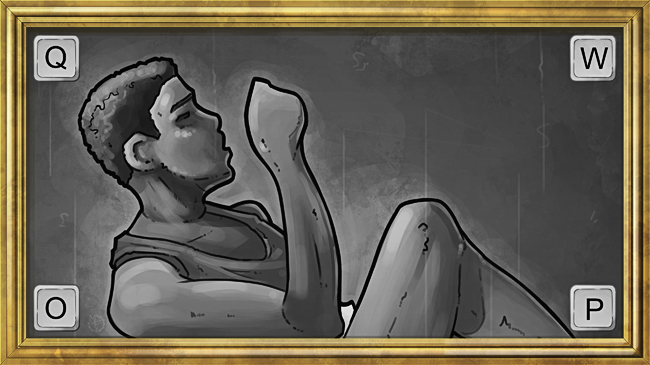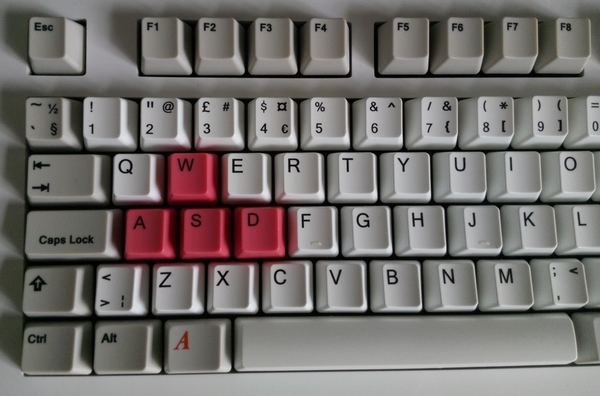QWOP was proof that games can be slapstick comedy
Bennett Foddy's 2008 browser game was the deliberately clumsy forerunner of an age of funny failure.

QWOP was the very last "computer lab game" I ever played: those itty-bitty projects that were loadable in a browser or easily shared over thumb drives. The hours my high school teachers set aside for citing academic papers and practicing our typing were instead dominated by Line Rider, Soldat, and dozens of others just like them.
QWOP introduced me to the idea that a game could have bad controls on purpose.
The key to a good computer lab game was simplicity. You never knew when a librarian would notice you wasting precious public school pixels, so they were mostly the kind of games to make you feel accomplished in 30 seconds or less. But nobody feels accomplished after 30 seconds of QWOP.
That is, however, enough time to understand its wonderfully simple trick. And it's thanks to that simplicity that, even 10 years later, it's still one of the best examples of how videogames are a wonderful, underused medium for physical comedy.
The premise is that you're an Olympic runner, named Qwop, from a country with under-funded athletics training who nonetheless must compete in the 100-meter dash. QWOP's nonsensical name becomes clear as soon as you see the controls. To "run" the dash, you control the sprinter's thighs and calves individually with the Q, W, O, and P keys.
You might even think the control scheme makes sense at first blush. I certainly did when I booted up the game on a friend's spoiler-free recommendation. As a much younger man, I thought it was strange to strafe around Unreal Tournament with WASD when my keyboard had four perfectly good arrow keys. Maybe this was something similar? But no, the second you try to lift Qwop's flat-shaded gams, the gag becomes clear faster than your face hits the dirt.
Plenty of games have bad controls, but QWOP introduced me to the idea that a game could have them on purpose. It benefited immensely from that element of surprise. It's not something you could totally replicate today; not when livestreaming bad games for laughs is so ingrained in popular culture, and a generation of other "failure games" followed it (such as Surgeon Simulator and QWOP developer Bennett Foddy's own Getting Over It). But a decade ago, surrounded by barely pubescent pals, in a self-serious hall of learning? QWOP was a revelation.
QWOP builds on the basics of physical comedy. Just like Charlie Chaplin and Jackie Chan films, it's a game about doing the unexpected with the familiar.
The biggest gaming news, reviews and hardware deals
Keep up to date with the most important stories and the best deals, as picked by the PC Gamer team.
Most games—whether meant for 30-second bursts in the computer lab or not—promise satisfying output for a particular input. The rewards can manifest as experience points, better loot, or just the satisfaction of shooting, but the value of inputs are pretty universal. You press keys or twiddle thumbsticks. You run your fingers across WASD the same way in Call of Duty as in Fortnite and the thing that's supposed to happen happens.

Not so in QWOP. You press the keys and, sure, Qwop moves, but you instantly realize the process will not be a smooth one. You're neither used to consciously thinking about operating individual joints in real life (assuming you're lucky enough to have two working legs) nor in games. So our stalwart sprinter fails to perform one of the most intuitive actions of two worlds. And he fails spectacularly.
QWOP played with the familiar elements of games deliberately, but today we often see its spirit replicated by accident. As technology evolves to let games appear more realistic, we're able to map more of our real-world expectations onto them without thinking. But of course games aren't the real world. Their laws of physics can corkscrew out of control at the drop of a grenade thanks to bugs and unforeseen player interactions.
PlayerUnknown's Battlegrounds is the current drunken master of these unintended gold-star goofs. Its blend of mostly realistic graphics with only ho-hum physics unlocks businesslike flying shotgun kills and tidal waves of Top 10 Funniest Glitches compilations. Although, for my money, no single one of them matches up to what is still the greatest bug of all time.
They all have something in common. Whether deliberate gags or fortuitously recorded anomalies, they all operate on the simple windup and pitch that QWOP boils down to its essence in less than 30 seconds. All games rely on our expectations—either the ones they instill, or the ones they expect us to carry with us—but QWOP was the first game that showed me you could subvert them for a laugh.
This article is part of the Class of 2008, a series of retrospectives about indie games that were released 10 years ago.

